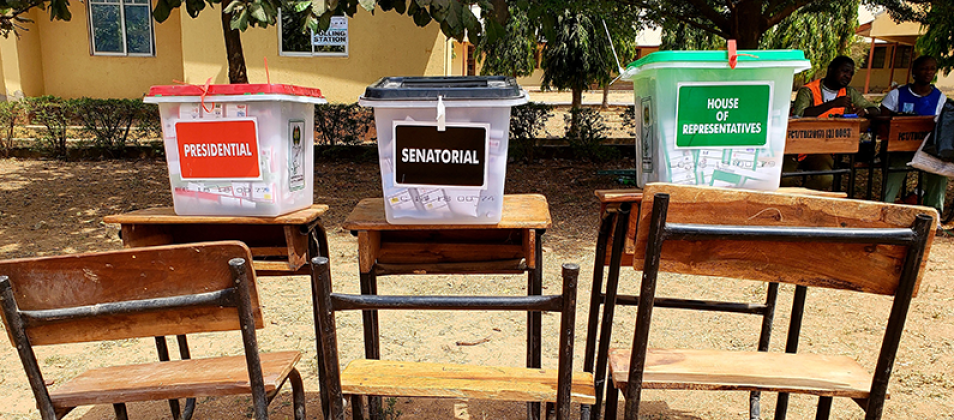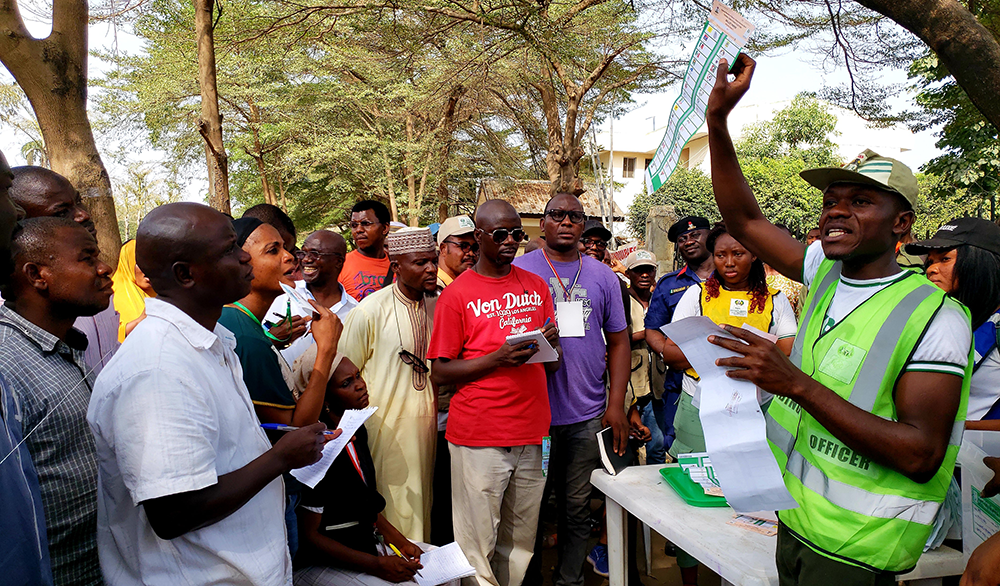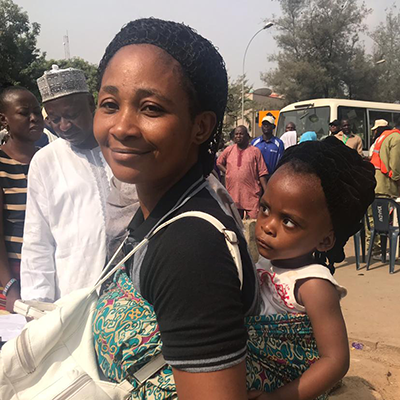
Nigeria Holds Greatly Anticipated 2019 Presidential and National Assembly Elections
Nigeria’s presidential and National Assembly elections were originally scheduled for February 16, 2019, and the gubernatorial and State Assembly elections for March 2, 2019.
On February 16, approximately five hours before polls were scheduled to open at 8:00 a.m., the Independent National Electoral Commission (INEC) announced the postponement of the highly anticipated elections, citing logistical concerns. This is the third postponement of elections in Nigeria, following postponements in 2011 and 2015. The presidential and National Assembly elections were thus rescheduled for February 23 and the gubernatorial and State Assembly elections for March 9.
On February 23, Nigerians went to the polls to cast their votes in the presidential and National Assembly elections. Elections were held nationwide across the 36 states of Nigeria as well as the Federal Capital Territory. Out of approximately 190 million people in Nigeria, 84 million were registered as voters. Of those registered voters, over 73 million collected their permanent voter’s cards (PVC), which all registered voters must have to cast their vote on Election Day.
What was the mood on Election Day?
The mood on Election Day among voters was mixed. Voters were generally happy to be able to go to the polls so that they could indicate support for their preferred candidates and have a voice in shaping the future of Nigeria. However, many individuals expressed frustration with the logistical issues, which resulted in delayed openings at a number of polling units. These delays occurred despite the extra week for preparations for INEC resulting from the postponement. At midday on Election Day, INEC announced that polls where opening was delayed would remain open past the mandated 2:00 p.m. closing time to allow voters to cast their ballots. As described in more detail below, turnout was expected to be low due to general voter apathy and the postponement.
How was security on Election Day?
Election Day in Nigeria comes with a series of standard security practices. The police are mandated to coordinate security measures on Election Day, with unarmed police present at polling units to keep order and provide security. Despite efforts to maintain consistency in security measures across Nigeria there were reported shortfalls and gaps in police presence on Election Day.
In addition to the police, the Electoral Act states that the Nigerian military can provide support on Election Day for “the purpose of securing the distribution and delivery of election materials,” and on Election Day, they provided security support on major roads and highways. To enable a smoother transfer of election materials, personal vehicle travel on Election Day is restricted and only authorized vehicles can travel by road. Authorized vehicles include security services, registered domestic and foreign observers, and emergency services. Polling units are strategically placed in areas within walking distance of registered voters to avoid traffic on the roads.
On Election Day, violence was reported in areas across the country, including instances of intimidation, harassment, kidnapping and killings. Final numbers on the scope of the election-related violence have yet to be released as of February 28. The police will conduct official investigations into incidents of violence.
How was turnout?
Voter turnout on February 23 was 34.7 percent, compared to 43.6 percent in 2015. Based on initial observations on Election Day, the turnout for the 2019 election was expected to be either the same or lower than in 2015.
Voter turnout could have been impacted by a variety of factors, including apathy as well as financial and logistical strain on voters caused by the election postponement. Many Nigerians must travel long distances to vote in the home regions where they are registered, which might be a significant distance from where they live and work. Absentee voting is not practiced in Nigeria and all voting must be done in person. A significant number of voters had traveled to their home regions to participate in the originally scheduled February 16 election, and some may have been unable to make the second trip one week later to cast their ballot on February 23. The Nigerian government declared Friday, February 22, a national holiday to encourage people to travel to be able to cast their votes and ameliorate some of the postponement’s impact on turnout.
In the pre-election period, it had been anticipated that the 2019 presidential and National Assembly election turnout might be higher than previously seen in Nigerian elections. In 2019 86.6 percent of voters collected their PVCs, an improvement of 4.7 percentage points compared to 81.9 percent in 2015. This increase in collected PVCs indicated an increase in the overall percentage of eligible voters, as PVCs are required to be able to vote.
When were results announced?
The official announcement of results for the National Assembly elections by INEC state officials started as early as February 24. On February 27, INEC Chairman Mahmood Yakubu declared incumbent President Muhammadu Buhari the winner of the presidential election.
When will the new representatives take office?
The newly elected president, senators and members of the House of Representatives will take office following inauguration day on May 29.
What is the significance of these elections?
Nigeria has an uneven democratic history, and the conduct of free, fair, peaceful and credible elections in 2019 can further entrench democratic norms in the country. In 2015, Nigeria had a major milestone election when incumbent President Goodluck Jonathan conceded defeat to opposition candidate Muhammadu Buhari. This marked the first time an incumbent president had lost the presidential election in Nigeria and the first democratic transition of power. The 2019 elections are another test for the overall functionality and inclusiveness of the Nigerian electoral process. The public reaction to the INEC announcements of election results is the next test for the credibility of the electoral process.












